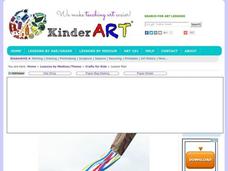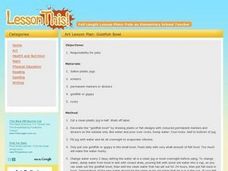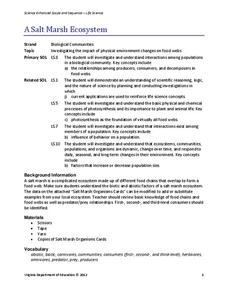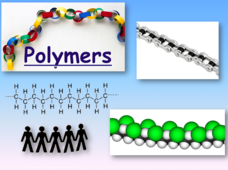Curated OER
Plastics: Field Trip - Vancouver Landfill
Students examine the amount of garbage that is produced by the City of Vancouver. In this landfill lesson, students participate in a field trip to the City of Vancouver Landfill. They look at what happens to garbage, recycling, and yard...
Curated OER
Valentine’s Day Unit: Writing & Literacy Center Activities
Students participate in Valentine's Day writing and literacy center activities. In this writing and literacy lesson, students develop Valentine's Day journals using recycled cards and small blank sheets of paper. They write sentences...
Curated OER
Ecosystem Energizers
Fourth graders see how the flow of energy through an ecosystem made up of producers, consumers, and decomposers carries out the processes of life and that some energy dissipates as heat and is not recycled.
Curated OER
How Can We Conserve Water?
Students describe the importance of water conservation and list ways to conserve. They construct composts and fill them with materials that recycle nutrients. They inspect their homes for leaky pipes, toilets, and faucets.
Curated OER
Brown Bag Kites
Students observe and discuss kites. They create a kite out of recycled materials, such as paper bags, paper scraps, leftover glitter, and buttons.
Curated OER
Paper Dragon Puppet
Learners construct simple dragon puppets in honor of Chinese New Year. They are introduced to Chinese mythology, make the puppets out of recycled materials and put on a show with the finished puppets.
Curated OER
Paper Masks/Heads
Students examine the processes and beliefs used by different cultures to create works of art. Using the internet, they research the types of arts used by cultures that have been transmitted to future generations. They use recycled...
Curated OER
Water Filtering
Young scholars investigate how polluted water is filtered so people can use this recycled resource. They conduct an experiment in which they put "polluted" water through a filtering system. They investigate what happens at a water...
Curated OER
Pollution Vocabulary
In this pollution vocabulary learning exercise, learners define the terms ecology, conservation, recycling, chemicals, endangered species, and valuable. Students then use the words to complete the sentences about pollution.
Curated OER
Renewable Resources: Ancient Civilizations
Students examine how ancient people used natural resources. In this renewable resource lesson, students will be put into 5 groups each focusing on a different past civilization. Each group will identify they types of resources their...
Curated OER
UNWRAPPING PACKAGING
Students study product packaging and determine if it is excessive and if it is recyclable. In this packaging lesson students examine and identify waste reduction techniques.
Curated OER
Good Bug Survey
In this bug survey worksheet, students fill in squares on a graphic organizer with information about flowers currently blooming, hiding places for "good bugs," and any bugs they have seen that are helpful for pollination, as food for...
Curated OER
Pop Bottle Terrarium
Students make terrariums out of bottles, pebbles, cuttings from other plants, and water. In this terrarium lesson plan, students learn about recycling by using household items to make terrariums.
Curated OER
Energy Efficiency: It really IS important!
Young scholars compare the energy needed to produce new products versus recycling. For this physics lesson, students brainstorm ways to save energy. They create a presentation about the correlation between conserving energy and energy...
Live Oak Media
Activity Guide: Joseph Had a Little Overcoat
Enhance a reading of the Caldecott Medal-winning children's book Joseph had a Little Overcoat by Simms Taback with this collection of learning activities. Starting with general background information about the book and author, this...
Education Outside
Natural Dye Tie-Dye
Up-cycle, or reprocess waste materials, into colorful tie-dye clothing or banners with an activity that uses fruits and vegetable juices as dye sources.
Curated OER
Goldfish Bowl
Students discover proper pet care by creating a home for a fish. In this pet responsibility instructional activity, students create a goldfish bowl by cutting a plastic jug in half and decorating it with markers and stickers. Students...
Curated OER
Egg Carton Buggy Mobile
Craft paper, string, and clean egg cartons are used to create super cute bug mobiles. Included are instructions and images to assist you in guiding your class through the process of making these very cool mobiles. The project would be a...
Curated OER
Mass vs. Weight
Why do you weigh more in space? Each individual in your class explores this question and others as they determine the mass and weight of different objects using two types of scales. They perform conversions and discuss their results,...
It's About Time
Are Atoms Invisible?
Wow, an experiment that allows the class to participate in a missile war! Pupils discuss Thomsons's theory of cathode rays and simulate Rutherford's historical experiment to learn about atomic structure. They conclude this fourth lesson...
Virginia Department of Education
Go with the Flow
How does nature's hierarchy relate to our local human environment? Answer this question, along with others, as the class visually depicts the natural hierarchy provided by nature. Pupils discuss each piece of the pyramid and its energy...
Virginia Department of Education
A Salt Marsh Ecosystem
What a web we weave. Pupils use yarn as the primary resource to create a web depicting the intricacies of a salt marsh ecosystem. They participate in a question and answer session, which leads to an in-depth facilitated discussion about...
Virginia Department of Education
Predator-Prey Simulation
Do your pupils have the misconception that environmental predators are "bad" and harm smaller creatures? The simulation explains, in detail, the important role predators play in maintaining a stable ecosystem. Through web-based research,...
Science Geek
Polymers
A pirate's favorite amino acid is Arrrrginine! Presentation begins with the difference between a monomer and a polymer. Then it applies that to carbohydrates and proteins and ends with DNA and plastics. Presentation is the last in a...
Other popular searches
- Trash & Recycling
- Trash Recycling
- Global Warming Recycling
- Recycling Aluminum
- Recycling Activity
- Trash & Recycling Rubric
- Paper Recycling
- Trash & Recycling Test
- Trash & Recycling Plastic
- School Recycling
- Recycling Lessons
- Trash & Recycling Composting

























